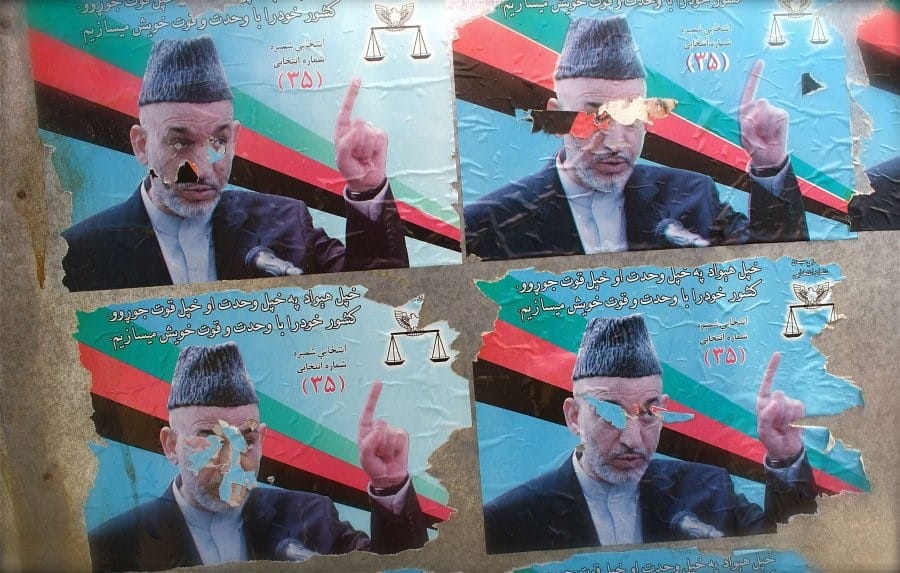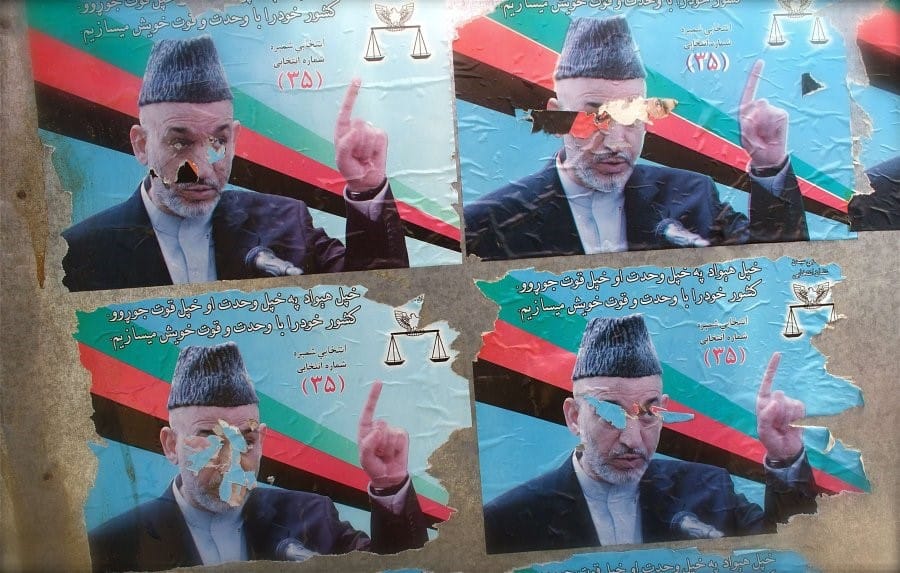Acrimony and recriminations continue to swirl around the 2020 presidential election. Three out of four Republicans believe that there was “widespread fraud” in the election, while Democrats have sought to turn criticisms of the election into a “Big Lie” heresy against democracy. Senior congressional Democrats are pressuring the nation’s largest cable providers to cease carrying conservative networks such as Fox News that raised too many questions about Biden’s victory.
What could possibly go wrong with sweeping the 2020 election controversies under the rug? Clues can be found in a recent report, “Elections: Lessons from the US Experience in Afghanistan,” produced by the Special Inspector General for Afghanistan Reconstruction (SIGAR). That report contains more wisdom than will be found in President Trump’s idiotic tweet in December: “A young military man working in Afghanistan told me that elections in Afghanistan are far more secure and much better run than the USA’s 2020 Election.”
Actually, “Afghan democracy” is one of the most brazen shams of US foreign policy in this century. Since the US invasion in 2001, the federal government has spent more than $600 million to support elections and democratic procedures in Afghanistan (part of the $143 billion the US spent there for relief and reconstruction there). Hamid Karzai, the smooth operator who the Bush administration installed to rule Afghanistan after 9/11, won a rigged 2004 presidential election. President George W. Bush boasted during his reelection campaign, “Afghanistan has now got a constitution which talks about freedom of religion and talks about women’s rights…. Democracy is flourishing.” A few years later, Karzai won support from fundamentalist voters by approving a law entitling a husband to starve his wife to death if she refused his sexual demands.
President Barack Obama justified his troop surge in Afghanistan to bolster its democracy. When Obama spoke to the Veterans of Foreign Wars convention in August 2009, he boasted that “our troops are helping to secure polling places for this week’s election so that Afghans can choose the future that they want.” At first glance, Karzai won a narrow victory. But two weeks after the election, the New York Times reported that Karzai’s operatives set up as many as 800 fictitious polling sites “where no one voted but where hundreds of thousands of ballots were still recorded toward the president’s re-election.” In some Afghan provinces, pro-Karzai ballots outnumbered actual voters by tenfold. Peter Galbraith, a senior United Nations official in Afghanistan, was fired after he estimated that a third of Karzai’s votes were bogus. Galbraith wrote, “No amount of spin can obscure the fact that we spent upwards of $200 million on an election that has been a total fiasco” which “handed the Taliban its greatest strategic victory.”
Despite the shenanigans, the Obama administration praised Karzai as if he had won fair and square. The Obama administration told Congress that the decision to send far more US troops to Afghanistan depended on the Afghan government’s “ability to hold credible elections,” among other tests. After the 2009 Afghan election turned into a sham, Obama decided it was “close enough for government work” to democracy. Thanks to Obama’s surge, 1,400 American soldiers died in part to propagate the mirage of Afghan democracy.
Afghan officials have conspired for more than 15 years to both multiply and ignore election fraud. As early as 2009, US Admiral Mike Mullen, then chairman of the Joint Chiefs of Staff, warned that the result was that the Afghan government’s legitimacy “is, at best, in question right now and, at worst, doesn’t exist.” An analysis by the US Agency for International Development of the 2014 Afghan election noted that “several prominent election officials associated with fraud during past elections were promoted or given ministerial appointments.” Afghanistan’s 2019 presidential election was “the most corrupt the country had ever held,” according to some experts SIGAR consulted.
U.S tax dollars poured into the coffers of Afghanistan’s Electoral Complaints Commission (ECC) to safeguard voting. Alas – that agency was a prime source of the most brazen vote stealing. ECC bosses were careful not to hire almost anyone with electoral experience since such folks might raise troubling questions. A former top ECC official told SIGAR that “one criterion for chief electoral officer applicants in 2018 was how well the candidates were dressed. He said this category was used as a pretext to reduce the scores of less pliable candidates.” It is unknown whether this villainy character test was inspired by Washington’s K Street lobbyists.
Push-button fraud
Afghan voting records are a mess, making it much easier to fabricate the “will of the people.” SIGAR concluded, “Afghanistan’s national voter registry and the voter registration process are exceptionally vulnerable to manipulation and mismanagement… The number of registered voters in Afghanistan is improbably high, given the population size and low turnout shortly after registering, which likely indicates registration fraud. Malpractice and lack of transparency also undermine the credibility of the voter registry.” In this country, controversies erupted in several states prior to the 2020 election over allegations that state voting roles had vast numbers of ineligible or deceased voters listed. Michigan delayed removing 177,000 inactive voters from the state’s voting roles until earlier this month and acted only after a lawsuit forced the state’s hand.
Afghan elections have been institutionalized racketeering in part because the rules for elections have always been in flux. SIGAR noted, “Only one of the country’s election laws has ever been passed by parliament; the rest were presidential decrees that were never referred to the parliament for consideration.” The SIGAR report quoted election experts: “The likelihood of a credible election is inversely proportional to the degree to which the ruling regime directly controls the election management body.”
America has mostly avoided similar debacles because the Founding Fathers included an Elections Clause in the Constitution specifying that the rules for federal elections (president and Congress) “shall be prescribed in each State by the Legislature thereof.” Unfortunately, that constitutional provision was trampled last year in many states. Time magazine recently revealed “the secret history of the 2020 election” – “a well-funded cabal of powerful people… working together behind the scenes to… change rules and laws” to “fortify” democracy. Democratic Party officials and election commission officials appointed by Democrats scorned state law to rewrite the rules for the 2020 election in several swing states.
A brief filed with the Supreme Court in December by the state of Texas noted, “Michigan’s Secretary of State, Jocelyn Benson, without legislative approval, unilaterally abrogated Michigan election statutes related to absentee ballot applications” by sending “unsolicited absentee-voter ballot applications by mail to all 7.7 million registered Michigan voters… without verifying voter signatures as required” by state law. The impact was compounded when Democratic officials in the state’s most populous county (including Detroit) “made the policy decision to ignore Michigan’s statutory signature verification requirements for absentee ballots.” Elsewhere, the Wisconsin Elections Commission approved setting up to 500 unmanned ballot drop boxes in major Democratic cities in violation of Wisconsin law.
Politically-appointed judges effectively overturned state law by mandating new election procedures in several states. In Pennsylvania, the state Supreme Court invoked a vaporous phrase in the state constitution – “Elections shall be free and equal” – to justify invalidating a state law that prohibited counting mail-in ballots that arrived after Election Day; the judges even mandated including late ballots arriving with no postmark. A similar provision was struck down on January 27 by a Virginia circuit court overturning the Virginia Board of Elections’ decree permitting counting mail-in ballots that arrived three days after the election without a postmark.
Elsewhere in the report, SIGAR notes the difficulty of building a viable democracy when elected officials formally receive a license to steal. After noting the hefty bribes that politicians pay to election officials, SIGAR explains: “One reason candidates may be willing to pay such high prices for seats in parliament is to protect ill-gotten fortunes…. By becoming members of parliament, they can gain access to new sources of illicit revenue and immunity from prosecution.” That parliament is the last place on earth to seek a constituency for honest elections.
Afghanistan also illustrates the perils of computer voting. As one election expert told SIGAR, “There is no difference between stuffing 100 ballots and pressing a button on an electronic voting machine 100 times.” Afghan President Ashraf Ghani decreed that the 2019 election must rely on electronic voting. But SIGAR noted that electronic voting “did not reduce fraud overall; it just displaced it to other parts of the electoral cycle.” Confidence in Afghan electronic voting was not assisted by the secrecy surrounding the software and equipment. After the 2019 presidential election, Afghanistan’s Independent Election Commission declared that it could not “share information” about how votes were being reconciled because “the contractor, Dermalog, controlled that process.” SIGAR quoted experts who warned that “because governments often control electoral commissions and the procurement of election technology, they are well placed to use it to commit fraud. The introduction of technology can also weaken the ability of political parties and observation groups to detect fraud.”
Luckily, no such problems occurred in the US presidential election last year, as confirmed by the recent billion dollar defamation lawsuits filed by Dominion Voting Systems against its critics. But the SIGAR report did cynically note, “The true purpose of adopting election technologies may not be to actually reduce fraud, but to create the illusion of doing so.”
Perhaps the real Afghan lesson is that there is no “guardian angel of democracy.” Politicians permitting citizens to vote does not assure that election results will receive even a whiff of legitimacy. Once fraud or suspicions of fraud reach a certain level, any election winners will be suspected scoundrels. More than 15 years of corrupt elections in Afghanistan have resulted in a central government with little or no popular support or credibility. A US Army colonel who deployed several times to Afghanistan told SIGAR that as early as 2006, the Afghan government had “self-organized into a kleptocracy.” Officials who were stealing everything else never hesitated to steal votes. The only reason the Afghan government has not yet been toppled by the Taliban is because of the presence of the US military.
And is there a lesson from the endless lies that US government officials have told about Afghan democracy? At a confidential 2015 National Security Council meeting, President Obama admitted that the US would never “transform Afghanistan into a semblance of a democracy able to defend itself,” the New York Times reported. But that didn’t deter Obama from publicly bragging the following year that US troops and diplomats had helped Afghanistan “establish a democratic government.” Are US government officials more honest when they talk about American democracy than when they praise sham democracies abroad?
Regardless of any Trump tweets to the contrary, US election processes remain far more credible than Afghanistan’s. But last year’s election was the fourth US presidential election since 2000 that was widely perceived as heavily tainted. When the Supreme Court voted last week not to hear cases challenging arbitrary changes in state election procedures, Justice Clarence Thomas dissented, “The decision to leave election law hidden beneath a shroud of doubt is baffling. By doing nothing, we invite further confusion and erosion of voter confidence.” Unfortunately, almost no one is talking of the peril of the “Afghanization” of American democracy.
Reprinted with permission from the American Institute for Economic Research.


